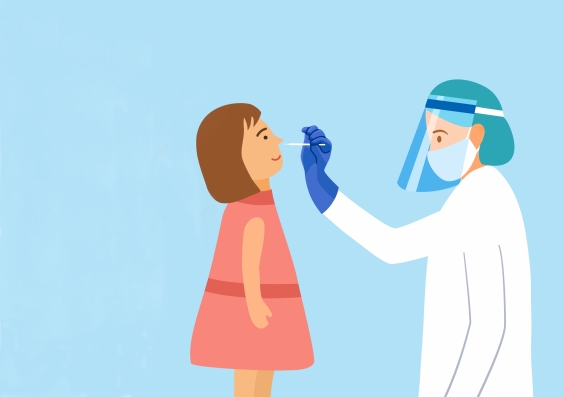How to help children mentally prepare for COVID-19 testing
The thought of having a COVID-19 test can be harrowing for some children, but these helpful tips may help ease the nervousness.
The thought of having a COVID-19 test can be harrowing for some children, but these helpful tips may help ease the nervousness.

COVID-19 testing can be daunting for adults, let alone children. Ashneeta Prasad, a clinical psychology registrar from UNSW’s School of Psychology has provided tips on how to prepare your kids for a COVID-19 test.
“Remember that children often look to their parents to co-regulate their emotions. If parents remain calm, children are more likely to remain calm. For this reason, it is important for parents to check in with themselves regarding how they feel about the testing process,” said Ms Prasad.
She recommended being mindful of verbal and body language when talking about the testing process. The use of neutral language acknowledges the child may be nervous but reassures the child they will be okay. For example, “I know that you might be a bit nervous about going for this test…. but everything is going to be okay, and I am going to be there with you the entire time”.
Also, reinforce the importance of the testing process: “It’s really important we get tested so we can keep everyone safe”.
Ms Prasad recommended briefly outlining the process in an age-appropriate way, so the child does not feel the experience was sprung on them. For unfamiliar or unpleasant situations, managing the child’s expectations and preparing them sufficiently is key to minimising distress.

Ms Prasad said during testing, remind the child everything will be okay and you will be with them the entire time. Photo: Emi Berry
“However, parents should be careful to not over-explain as this can also increase the child’s anxiety. Try to use simple, brief and factual statements in age-appropriate language.”
For younger children, this could include brief statements that pre-empt what they may feel along with reassurance that the experience will be over quickly: "You might feel a bit of a tickle or stuffiness in the nose, but it will be over very quickly."
For older children, who may have more questions, it can be helpful to add brief descriptions of the surrounding context. For example, where the test will take place, noting that medical staff will be in masks and personal protective equipment, which may be helpful if they have more questions.
Also, discuss and plan for a reward after the test to motivate the child to participate. For example, “Once the test is over, we can go get some ice-cream because you were so brave!"
“During testing, remind the child everything will be okay and you will be with them the entire time.”
Ms Prasad said it is common for many children to feel the urge to pull away during the swab. In such cases, having an alternative task to do such as squeezing a favourite toy, stress ball, or playing with a fidget toy may be helpful. This can help children to temporarily distract themselves from the discomfort and complete the testing process.
“After testing, use lots of verbal praise and non-verbal warmth such as hugging, kissing, and high-fives to commend the child on persisting with the testing. Link compliance back with helping to keep everyone safe.
“Parents should also reward themselves appropriately if they experienced a lot of anxiety or apprehension. At any age, the testing process can be difficult.”